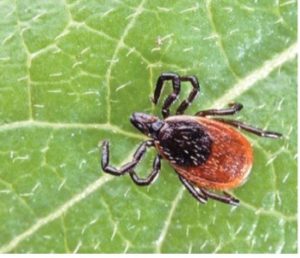May is National Lyme Disease Awareness Month. It is the time of year we wish to raise awareness of ticks and the disease they cause in pets, particularly in dogs. While a dog can be infected from a tick bite any time of year, ticks thrive in warm weather. And we have seen more cases cropping up over the years in Santa Clarita. Because the disease can cause severe illness and even death, it is crucial to know about Lyme Disease and how to keep your furry loved ones safe.
What Is Lyme Disease?
Lyme disease is a bacterial illness transmitted to humans, dogs, and other animals by Deer Ticks.
When a Deer Tick bites a person or an animal, the bacterium gets transmitted to their bloodstream.
Here is what a Deer Tick looks like:

The most common symptoms of Lyme disease in dogs are:
- Lameness
- Swollen lymph nodes
- Joint swelling
- Fatigue
- Loss of appetite
The above symptoms typically occur at the chronic disease stage and as early as 2-5 months after infections, although signs can develop much later.
If Lyme disease is left untreated, symptoms can progress to kidney failure and even be fatal in severe cases. Serious neurological impacts and cardiac effects may also occur due to untreated Lyme disease.
Where Do Ticks Live?
You will most commonly find ticks outdoors in leaf litter, shrubs, or bushes. Ticks also exist in non-wooded areas. You can also find them in tall grasses. Ticks attach and cling on to passing animals. For this reason, it is essential to check your pet for ticks after you’ve spent any time outdoors. If you feel a small bump on your pet, be sure to part your pet’s fur and take a closer look.
How to Remove Ticks from Pets
There are old myths about how to remove ticks. Some people thought you could remove a tick by exposing it to heat. Another is dousing the tick with peppermint oil. Others believed that you had to twist the tick to get it out. These are neither safe nor effective methods.
For the safest method, watch the video from PetMD below.
How to Get Ticks Off Dogs: How to Kill a Tick and Remove the Head From Your Dog | PetMD
Lyme Disease Diagnosis and Treatment
Diagnosis is made by a combination of history, physical signs, and blood tests. Using this combination, we can see if a dog has been exposed to the bacterium that causes Lyme disease.
Treatment includes antibiotics, usually for at least 30 days. However, it’s essential to follow your veterinarian’s advice regarding follow-up care after we have diagnosed and treated your pet.
Lyme Disease in California
Here in California, in the last several years, there have been new studies done that show an increasing prevalence of ticks carrying Lyme disease near beaches.
Initially, researchers thought that Lyme disease-carrying ticks mainly inhabited wooded areas, but a surprising percentage of ticks found on coastal shrubs have tested positive for Lyme disease, more so even than woodland ticks.
Lyme Disease Prevention
The best treatment for Lyme disease is preventative treatment. Here are tips from the AVMA to help you prevent Lyme disease:
- There are several products that contain tick preventatives and, are very effective to help decrease tick exposure. The second method of prevention is vaccination. Please speak with us about which tick preventive product is right for your pet.
- When possible, avoid areas where you and your dog might come into contact with ticks. These include tall grasses, marshes, and wooded areas.
- Check for ticks on both yourself and your animals once indoors after being outside.
- Clear shrubbery next to homes.
- Keep lawns well maintained.
Final Words
By working with us to get your pet on preventative treatment and following the above guidelines, you can be proactive in keeping your pet healthy and safe from Lyme Disease. Having your pet come in for a wellness exam is another way that you can ensure they do not have Lyme disease or any other health problems. Preventative health care is the best way to give your pet a healthier, happier life! Our Annual Exam Package includes a wellness exam, a fecal test, and a heartworm test.
Sincerely,
Jaimie Ronchetto, DVM
Cinema Veterinary Centre

